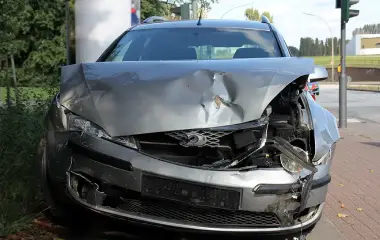The throttle body sensor plays a crucial role in the proper functioning of a vehicle's engine. When this component starts to malfunction, it can lead to various issues that affect the overall performance of the vehicle.
In this blog, the team at 1800 Salvage will explore the symptoms of a bad throttle body sensor, the potential causes behind its malfunction, and the necessary steps to address the issue. We buy old and broken down cars all across Australia — so we've really seen it all!
Understanding the throttle body sensor
The throttle body sensor, also known as the throttle position sensor (TPS), is responsible for monitoring the position of the throttle valve in the engine. This information is crucial for the engine control unit (ECU) to determine the appropriate air-fuel mixture for combustion. The throttle body sensor essentially helps regulate the engine's performance by ensuring the right amount of air enters the combustion chamber.
Therefore, when this component becomes faulty, it can decrease the performance of your overall vehicle. So, how can you tell when your throttle body sensor is malfunctioning?
Symptoms of TPS sensor failure
There are many signs that indicate your bad throttle body sensor is in need of serious repairs or replacement. Keep a look out for the following:
Poor acceleration
One of the primary indicators of a failing throttle body sensor is poor acceleration. If you notice sluggish or unresponsive acceleration, it may be attributed to an inaccurate reading from the sensor, leading to an incorrect air-fuel mixture.
Unstable idle
A malfunctioning throttle body sensor can cause erratic idling. The engine may experience fluctuations in RPM (revolutions per minute) when the vehicle is stationary, leading to a rough or unstable idle.
Stalling or surging
Inconsistent signals from the throttle body sensor can result in engine stalling or surging. These issues can occur during both idle and driving conditions, posing a safety risk and indicating a potential problem with the sensor.
Difficulty shifting gears
For vehicles with automatic transmissions, a faulty throttle body sensor can impact the shifting of gears. You may experience delays or harsh shifts due to the inaccurate throttle position readings.
Check Engine Light (CEL) activation
When the ECU detects irregularities in the throttle body sensor readings, it triggers the check engine light. This warning signals the need for a diagnostic scan to identify the specific issue.
Causes of throttle body sensor malfunction
Wear and tear
Over time, the throttle body sensor can undergo wear and tear, affecting its accuracy. Environmental factors, such as exposure to extreme temperatures or contaminants, can contribute to sensor degradation.
Electrical issues
Faulty wiring, poor connections, or electrical malfunctions can disrupt the communication between the throttle body sensor and the ECU, leading to erratic readings and performance issues.
Incorrect voltage supply
An improper voltage supply to the throttle body sensor can impact its functionality. Voltage irregularities can stem from issues with the vehicle's electrical system or a failing power supply to the sensor.
Carbon buildup
Carbon deposits on the throttle body can interfere with the sensor's movement and accuracy. This buildup can be a result of poor fuel quality or incomplete combustion.
.webp)
Solutions to throttle body sensor issues
Inspecting the wiring and connections
Check the wiring and connections associated with the throttle body sensor for signs of damage or corrosion. Repair or replace any faulty components to restore proper electrical conductivity.
Replacing the throttle body sensor
In cases of irreparable sensor damage, replacement becomes necessary. Ensure you use a quality OEM or aftermarket replacement part and follow the manufacturer's guidelines for installation.
Voltage testing
Verify the voltage supply to the throttle body sensor to ensure it falls within the specified range. Address any issues with the vehicle's electrical system or power supply that may be causing voltage irregularities.
Is it expensive to fix a throttle body sensor?
While replacing a throttle sensor doesn't involve a complete motor swap, it can still present challenges, particularly in terms of cost. The complexity of the job and associated expenses largely depend on the type of vehicle you own.
If your vehicle has an accessible throttle positioned visibly, the repair should be relatively straightforward, and the cost might stay below $500, inclusive of parts and labour. However, certain cars pose greater complexity, with throttles tucked away and requiring extensive disassembly, such as removing the intake manifold and air filter box. In these cases, the price tag for replacing a seemingly small sensor could easily double, reaching close to $1000.
Therefore, it’s important to consider both the accessibility of the throttle sensor and the specific demands of your vehicle when estimating potential repair costs.
Is a throttle sensor worth the repair?
When dealing with a faulty Throttle Position Sensor (TPS), the decision to repair or not hinges on the overall condition of your vehicle. If your car is relatively new and has low mileage, fixing the TPS issue might be a worthwhile investment, ensuring a continued smooth performance on the road. However, suppose your vehicle already has existing damages, high mileage, and additional mechanical problems. In that case, it may be more beneficial to sell your vehicle and avoid pouring your hard-earned money into a potential money pit.
If you’ve got a broken TPS that isn’t worth saving, you can always sell your salvage vehicle to 1800 Salvage. We specialise in handling vehicles with various issues, including those with a malfunctioning TPS. By choosing this service, you can streamline the selling process, avoiding the complexities associated with privately selling a car with mechanical problems. 1800 Salvage's expertise ensures a fair evaluation of your salvage vehicle, providing you with a competitive offer despite the TPS issue.
.webp)
Get cash for damaged cars at 1800 Salvage today
Whether your vehicle has a bad throttle position sensor, poor fuel economy, reduced engine power, or anything in between - our team at 1800 Salvage are happy to provide top cash for cars in any condition.

.jpeg)

.jpeg)

.jpeg)

.webp)
